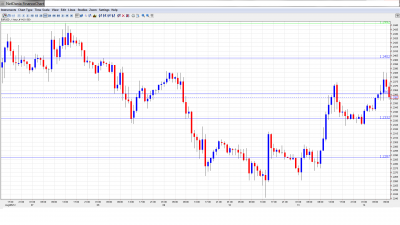EUR/USD continued its rise from yesterday’s (Aug. 13) levels, as GDP figures out of Germany and France were better than forecast. German ZEW Economic Sentiment disappointed the markets, posting its lowest level in 2012. With a host of releases out of the Euro-zone and the US today, we could see some movement by EUR/USD. Highlights include three key US releases – Core Retail Sales, Retail Sales and PPI.
Here’s an update about technical lines, fundamental indicators and sentiment regarding EUR/USD.
EUR/USD Technical
- Asian session: Euro/dollar edged upwards, consolidating at 1.2364. The pair is unchanged in the European session.
- Current range: 1.2360 to 1.24.
Further levels in both directions:
- Below: 1.2360, 1.2330, 1.2288, 1.22, 1.2144, 1.2043, 1.20, 1.1876 and 1.17.
- Above: 1.24, 1.2440, 1.2520, 1.2623, 1.2670, 1.2743 and 1.2814.
- 1.24 is the next line of strong resistance.
- The pair is testing 1.2360.
Euro/Dollar up slightly on positive German, Greek GDP – click on the graph to enlarge.
EUR/USD Fundamentals
- 6:00 German Preliminary GDP. Exp. +0.2%. Actual +0.3%.
- 6:45 French Preliminary Non-Farm Payrolls. Exp. -0.1%. Actual -0.1%.
- 9:00 German ZEW Economic Sentiment. Exp. -19.4 points. Actual -25.5 points.
- 9:00 Euro-zone Flash GDP. Exp. -0.2%. Actual -0.2%.
- 9:00 Euro-zone Industrial Production. Exp. -0.6%. Actual -0.5%.
- 9:00 Euro-zone ZEW Economic Sentiment. Exp. -19.1 points. Actual -21.2 points.
- 12:30 US Core Retail Sales. Exp. +0.4%.
- 12:30 US PPI. Exp. +0.3%.
- 12:30 US Retail Sales. Exp. +0.3%.
- 12:30 US Core PPI. Exp. +0.2%.
- 14:00 US Business Inventories. Exp. +0.2%.
- 14:00 US IBD/TIPP Economic Optimism. Exp. 47.4 points.
EUR/USD Sentiment
- More talk, more help for Greece: The EU / ECB / IMF delegation left Athens and said they were making progress in their negotiations with the Greek government. Talks are not scheduled to resume until September, after Greece has a scheduled bond repayment to the ECB. Greece is expected to raise the money in the markets on Tuesday with the help of the ECB, in order to repay the ECB. That’s how things work now. The head of the Eurogroup, Jean-Claude Juncker, said that he doesn’t foresee a Grexit “at least until the end of the autumn. Also, a former ECB chief economist hinted about a euro exit. Greece reported a year over year contraction of “only” 6.2% in Q2, better than 6.5% in Q1, and beating the estimate of 7.0%. When it comes to Greece, the markets appear to be taking the attitude that “less bad news is good news”. See how to trade the Grexit with EUR/USD.
- ECB doing some juggling:: In its Monthly Bulletin, the ECB revised its forecast of Euro-zone growth in 2012 from -0.2% to -0.3%. This negative news will increase the pressure on ECB head Mario Draghi to take action, especially regarding Italian and Spanish borrowing costs. Draghi recently declared that bond yields are unacceptable, and that the ECB will explore ways to act in the coming weeks. Italy and Spain want help, but don’t want more conditions and hesitate before asking for help. In Germany, opposition is growing for ECB intervention from Bundesbank figures. The reminder of bond buying by the Bundesbank in the 70s was seen as “blackmail” by the German orthodox bankers. Draghi is juggling between the Spanish and Italian desire and the German opposition.
- To QE3 or not?: Talk about QE3 or no QE3 continues after Boston Federal Reserve President Eric Rosengren declared that the Fed should implement QE3 in order to help the troubled US economy. In the meantime, encouraging signs were seen in the US: apart from the positive NFP, jobless claims remain low and the trade balance deficit fell to lows last seen at the beginning of 2011. Other market players, however, believe that the QE3 camp seems to miss a simple reality.
- Markets worried about German economy: Recent German economic data has been weak, with PMIs, industrial production and manufacturing orders all disappointing the markets. The markets finally received some good news, as German GDP (first release) was up 0.3%, better than the estimate which stood at 0.2%. However, German ZEW Economic Sentiment fell sharply to -25.5 points, its worst showing this year. Germany is not immune.
- Dark Clouds Over Italy: Borrowing costs rose after Italy auctioned the full targeted amount of EUR8 billion of one-year government bonds at a yield of 1.69%. This was up from the previous auction, which netted a yield of 1.55%. The economic picture in Italy is grim, as the country is carrying a debt-to-GDP ratio of 123%, and with another GDP decline, has officially been in recession for one full year. The Italian PM Mario Monti has been very active of late, but his popularity in Italy is diminishing, and he also managed to anger the Germans by taking a swipe and dismissing the importance of the Bundestag.

